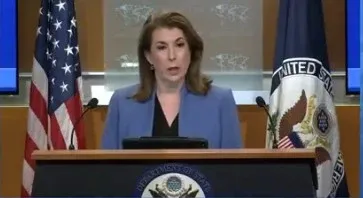What Message is the US Sending to India and Pakistan?

Synopsis
Key Takeaways
- The US emphasizes de-escalation and dialogue.
- Secretary Rubio has made calls to both Indian and Pakistani leadership.
- The US believes military action is not a solution to ongoing conflicts.
- Pakistan's support for terrorism is a longstanding concern for the US.
- Diplomacy is seen as the key to preventing further violence.
Washington, May 9 (NationPress) The United States conveyed a dual message to India and Pakistan amid escalating tensions following the Pahalgam terrorist attack: de-escalate and maintain dialogue.
In reference to calls made by U.S. Secretary of State Marco Rubio to India's External Affairs Minister S. Jaishankar and Pakistan's Prime Minister Shehbaz Sharif earlier that day, State Department Spokesperson Tammy Bruce emphasized during her daily briefing that the U.S. is concentrating on two key points.
"First, it should not escalate, and second, communication is fundamentally essential. There must be talks and no silence, and America is actively involved in discussions with various leaders from both nations over the past two days," Bruce stated.
She further noted, "The overarching message from the Secretary, and indeed from the U.S. as a whole, is that violence must cease. Military action and war, as evidenced in that region and the Middle East, have historically shown that they are not a solution as they lead to endless cycles of conflict. A change in approach is necessary. This administration has made it clear that military aggression and more violence are not solutions; diplomacy is the answer."
When questioned about whether Secretary Rubio had offered to mediate, Bruce described the situation as "very delicate and dangerous" and stated that "we will not discuss details where negotiations are occurring."
She continued, "It is crucial not to release details to the media while private discussions are underway between leaders; we must strive to maintain confidentiality."
In response to a query regarding a statement from Secretary Rubio's call with Prime Minister Sharif, which urged Pakistan to cease any support for terrorism, Bruce remarked, "This is a call we have been making for decades. The dynamics we observe in the Middle East disrupt lives. What transpired in Kashmir is tragic, and we send our condolences. The world has categorically rejected such violence, and the President continues to do so. At this moment, it is essential to halt the back-and-forth escalation, which is our current focus."
"The Secretary expressed his sorrow for the civilian casualties arising from the ongoing conflict. He reiterated his calls for Pakistan to take definitive steps to end support for terrorist organizations," Bruce stated earlier regarding Rubio's conversation with Sharif.
The U.S. has not hesitated to criticize Pakistan for its alleged support of terrorism.
"The U.S. has misguidedly provided Pakistan with over $33 billion in aid over the last 15 years, receiving nothing but deception in return, treating our leaders as naive," President Donald Trump remarked in a post on X during his first term in 2018. "They harbor the terrorists we pursue in Afghanistan with little assistance. No more!"










